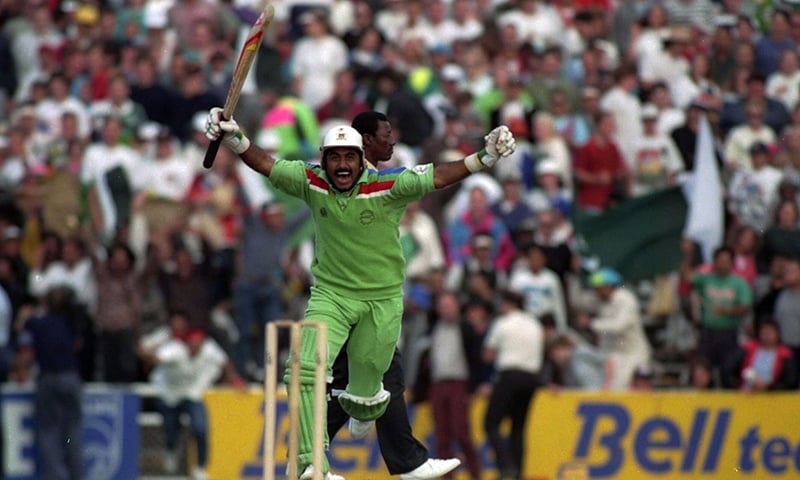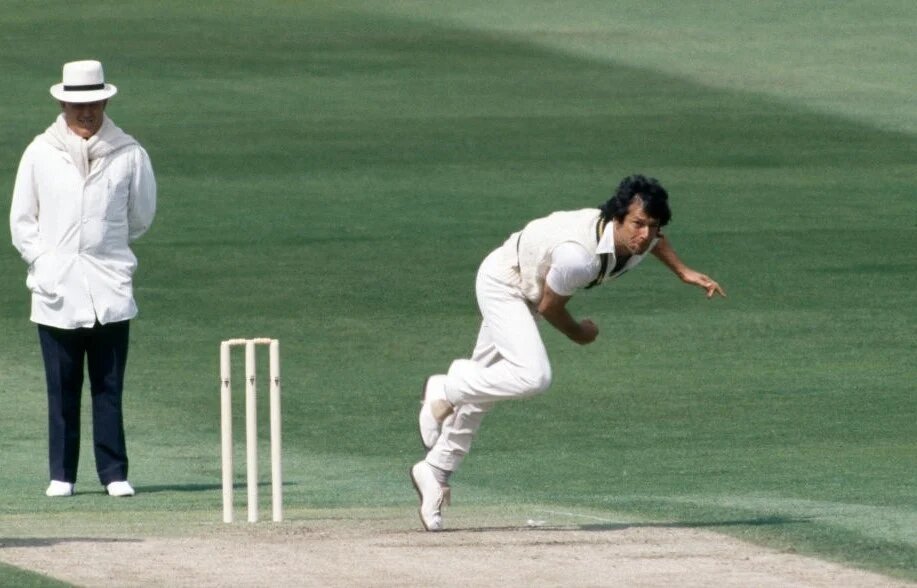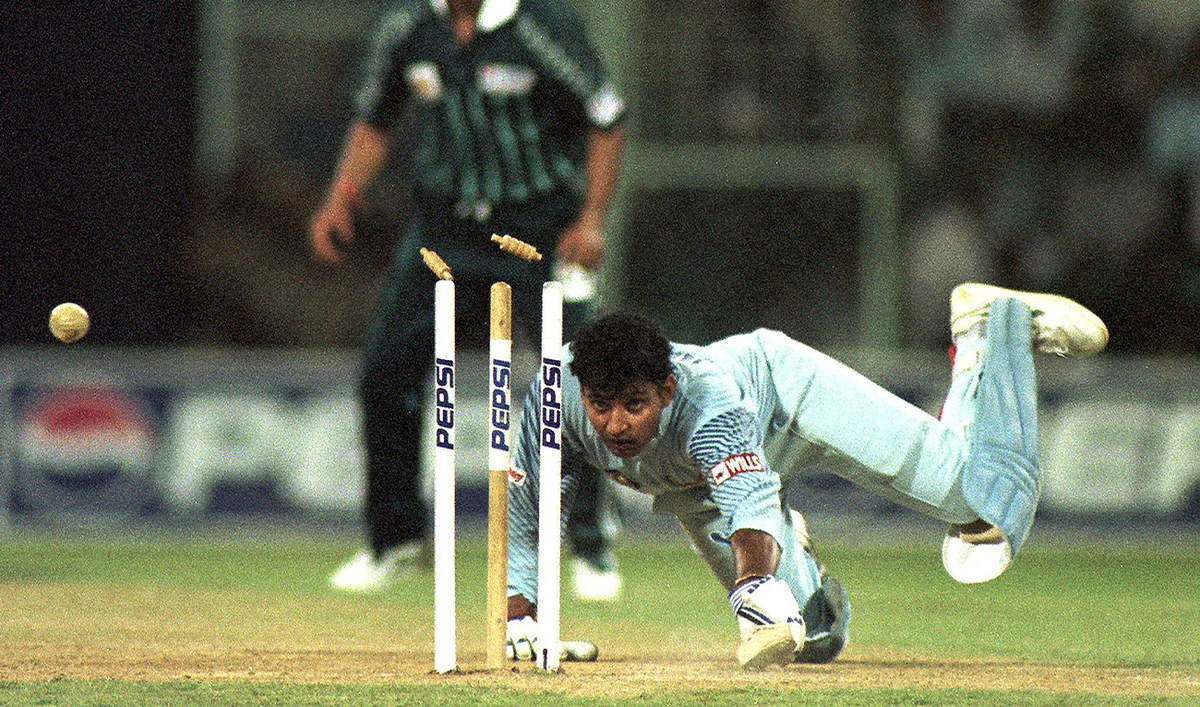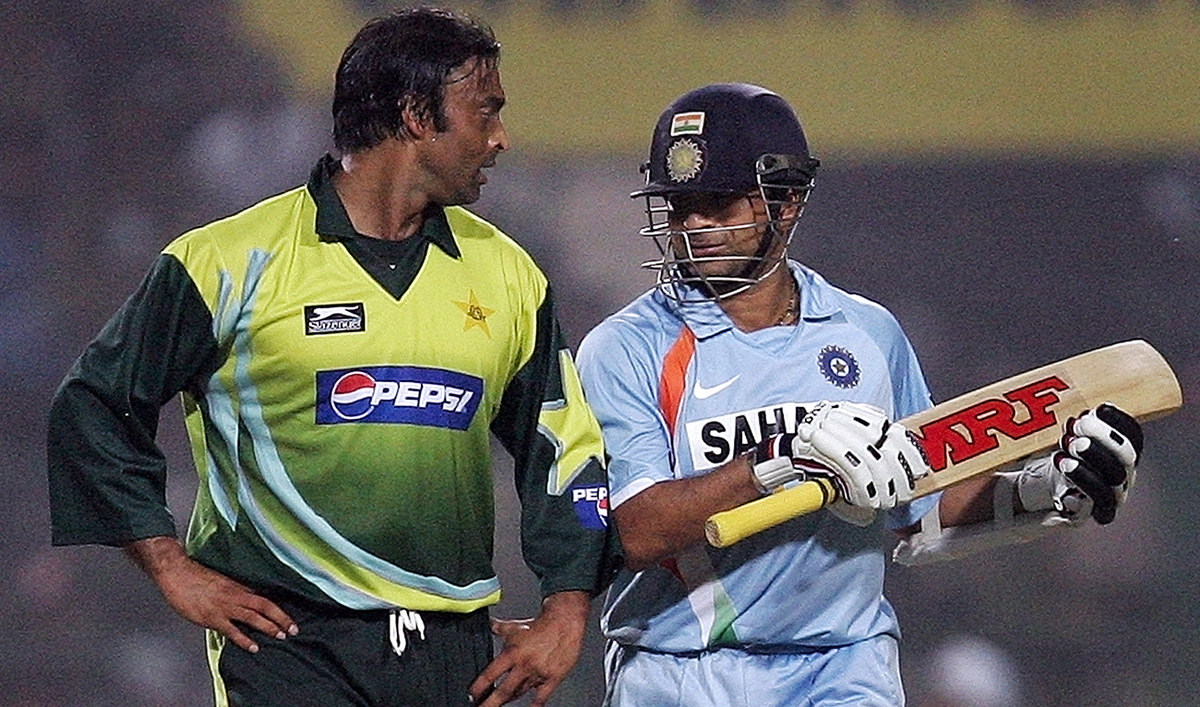AHMEDABAD: Cricketing powerhouses India and Pakistan renew their rivalry in the most hotly-anticipated match of the World Cup in Ahmedabad on Saturday.
AFP Sport looks back at six memorable ODI matches between the bitter rivals ahead of their latest clash.

Javed Miandad celebrates after scoring a last-ball six in this file photo. (Photo courtesy: Dawn)
Javed Miandad’s last-ball six at the desert venue arguably remains the most dramatic ODI outcome between the two sides as Pakistan clinched a one-wicket victory.
Pakistan needed 246 to win in 50 overs and Miandad walked in at 61-3 to hit an unbeaten 116 off 114 balls.
With four needed off the final delivery, Indian fast bowler Chetan Sharma bowled a full toss and Miandad blasted the ball into the crowd to trigger wild celebrations among the Pakistan team and fans.
Miandad was later presented with a golden sword for his heroics.

An undated file photo of Imran Khan bowling during a cricket match. (Photo courtesy: PCB/website)
Imran Khan’s best bowling figures of 6-14 were in a one-day international against India but for the flamboyant Pakistan fast bowler it was all in vain.
Imran ripped through the Indian batting line-up at Sharjah to send the opposition packing for 125.
But Pakistan’s own batting imploded, skittled for just 87 with Ramiz Raja, top-scorer with 29, one of only four batsmen in double figures.
Imran, a former Prime Minister who now languishes in jail over corruption charges he denies, was still the man of the match in the low-scoring battle.
India’s Ajay Jadeja blasted a 25-ball 45 in a late blitz that helped India knock out holders Pakistan in a highly-charged World Cup quarter-final.

In this file photograph taken on April 4, 1999, Indian batsman and team captain Ajay Jadeja dives to save himself from being run out as a throw from a Pakistani fielder directly hits the wickets in the triangular series final match between India and Pakistan at the Chinaswamy Cricket Stadium in Bangalore. (AFP/File)
Jadeja was severe on Pakistan’s Waqar Younis as he hit the pace bowler for four fours and two sixes in the final few overs to propel the total to 287-8.
In reply, Pakistan were sailing along when opener Aamir Sohail smashed India’s Venkatesh Prasad for a boundary before sledging his opponent.
But Venkatesh got the left-handed batsman bowled on the next ball to bring the house down and Pakistan lost their way to lose by 39 runs.

Pune Warriors captain Sourav Ganguly (C) celebrates their team victory against Delhi Daredevils during the IPL Twenty20 cricket match at Ferozshah Kotla stadium in New Delhi on April 21, 2012. (AFP/File)
Sourav Ganguly hit a match-winning century to trump Saeed Anwar’s 140 in a deciding best-of-three final of Bangladesh’s Silver Jubilee Independence Cup in Dhaka.
Ganguly’s knock of 124 was laced with 11 fours and one six as India chased down their victory target of 315 with one ball to spare.
The left-handed Ganguly was named man of the match but lesser-known Hrishikesh Kanitkar stole the show in the end when India needed three on the final two balls and he hit a boundary on the penultimate delivery.
The chase was a world record at the time.

Indian cricketer Sachin Tendulkar (L) and Pakistan's Shoaib Akhtar exchange words during their fourth One Day-International cricket match at the Captain Roop Singh Stadium in Gwalior, 15 November 2007. (AFP/File)
Sachin Tendulkar won many matches for India but his 98 against Pakistan at the 2003 World Cup remains special due his duel with fast bowler Shoaib Akhtar.
Tendulkar stood tall in his 75-ball knock that guided India in their chase of 274 against a Pakistan bowling line-up boasting Wasim Akram, Waqar and Akhtar.
He uppercut one of Akhtar’s express deliveries to a delightful six over third man — a shot that became iconic in Tendulkar’s career.
Akhtar later got Tendulkar’s wicket but the damage had been done and India won by six wickets.

Pakistan's Fakhar Zaman celebrates reaching his 100 during the ICC Champions Trophy final cricket match between India and Pakistan at The Oval in London on June 18, 2017. (AFP/File)
Pakistan came in as underdogs in the Champions Trophy final, but stunned India by 180 runs with a top performance riding on a sparkling century by Fakhar Zaman.
Zaman’s 114 off 106 balls and a 128-run opening stand with Azhar Ali guided Pakistan to a mammoth 338 for four and deflated Virat Kohli’s India at the Oval.
The left-hander clobbered the Indian attack, including fast bowlers Bhuvneshwar Kumar and Jasprit Bumrah, hitting 12 fours and three sixes.
Pakistan’s bowlers then came firing and dismissed India for just 158 in 30.3 overs despite Hardik Pandya’s 76. Fast bowler Hasan Ali took 3-19.















